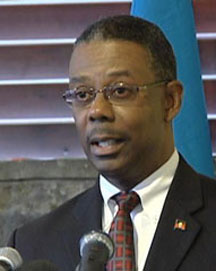MIAMI, (Reuters) – The United States violated global trade law by shutting down Internet gambling sites based in Antigua and elsewhere and prosecuting their owners, according to Antigua and Barbuda officials considering action in the World Trade Organization.
Antigua and Barbuda, which licenses Internet gambling companies, has waged a long battle in the WTO over U.S. efforts to keep Americans from patronizing offshore betting sites. Last week’s shutdown of the three biggest online poker sites has the Caribbean nation ready to go another round.
It contends U.S. crackdowns against foreign betting sites are illegal and protectionist, since gambling for money is permitted in U.S. casinos and since online betting is allowed for state-regulated horse racing in the United States.

“I don’t think there’s another country in the world that puts people in jail for engaging in trade that’s lawful under international law,” Mark Mendel, the Caribbean government’s legal advisor, told Reuters by telephone on Thursday. “It’s as if Antigua would put Americans in jail for selling pineapples.”
U.S. prosecutors in New York seized the domain names of three online poker sites last week, shutting them down and charging their owners with $3 billion of fraud and money laundering.
Prosecutors charged that the three foreign-registered companies tricked regulators and banks into processing illegal online gaming proceeds from U.S. customers.
U.S. prosecutors allowed two of the companies — PokerStars, which is incorporated in the Isle of Man, and Full Tilt Poker, which is incorporated in Ireland — to reopen their websites on Wednesday so players could withdraw funds from their accounts and so people outside the United States could resume playing.
Prosecutors said the third company, Antigua-based Absolute Poker, could do likewise if it agreed, as the others did, to prohibit U.S. customers from playing for anything of value and to appoint an independent monitor to enforce that agreement.
Antigua’s finance minister, Harold Lovell, issued a statement on Wednesday calling the shutdown an illegal attempt to squelch competition.
“I am concerned that at this point in time United States authorities continue to prosecute non-domestic suppliers of remote gaming services in clear contravention of international law,” Lovell said.
JOBS, REVENUE FOR ANTIGUA
Online gambling is the tiny island nation’s second-largest employer after tourism, according to the Journal of International Commerce and Economics. Antigua says its betting operators have every right to offer their services to American consumers, and the WTO has agreed.
It ruled in 2005 that the United States violated international agreements on trade in services by prosecuting the operators of offshore Internet gambling sites. The WTO rejected the U.S. argument that the restrictions were necessary to protect public morality.
Antigua claimed it was losing $3.4 billion a year because of the U.S. ban, but the WTO put the figure at $21 million. In 2007, it said Antigua could retaliate by suspending that amount annually in intellectual property rights held by U.S. firms.
Government officials from the Caribbean nation are meeting this week to discuss whether to go back to the WTO to seek more sanctions against the United States because of the poker shutdown.
The U.S. prosecutors said they shut down the sites because the owners laundered money and conducted fraudulent transactions. Mendel, Antigua’s lawyer, said the United States illegally blocked them from using regular credit cards and banking services.




